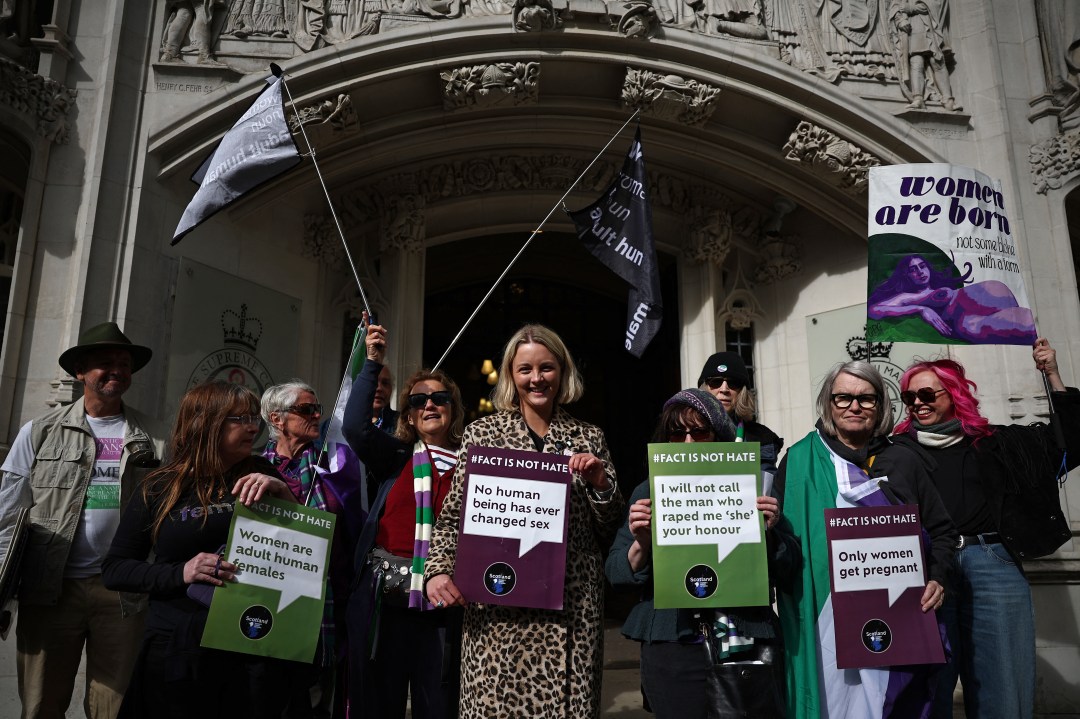The highest court in the land was set the task of determining: what is a woman? Today it gave its answer: sex in the Equality Act 2010 is biological and immutable and cannot be altered by a gender recognition certificate (GRC). The Supreme Court should be commended for securing women’s sex-based rights – rights to which they have should always have been entitled as a matter of law.
It will come as a surprise to many that a question with such an apparently obvious answer had to be settled in the Supreme Court. But such is the influence of gender ideology on policy that women’s legal rights have often been trampled underfoot.
This legal dispute dates back to 2018, when Scottish ministers issued statutory guidance which claimed a person whose ‘acquired gender is female’ could be understood as a woman. After the campaiging organisation For Women Scotland challenged this judgment, and after their case was rejected by the Inner and Outer Courts of Session, it reached the Supreme Court.
The fundamental problem here lies with a legal ambiguity. The Gender Recognition Act 2004 states that when a GRC is issued ‘the person’s gender becomes for all purposes the acquired gender [on the certificate]’. Until today’s judgment, there has been disagreement about what this means for the Equality Act. When the legislation refers to ‘sex’, should we understand this to mean biological sex, or ‘legal sex’ as modified by a GRC?
Policy Exchange first highlighted this problem in 2023, when we called for a simple clarification that sex in the Equality Act is biological – defined by chromosomal DNA and fixed at birth. Since then, nothing has been done. While the Conservatives did campaign at the last election on a commitment to clarifying the Equality Act, the current government had made clear that they had no plans to do so, which makes today’s judgment so important.
A matter with such wide-reaching legal implications should never have been allowed to have been thrashed out in court. Ministers should instead have acted on our recommendation and used their statutory powers to clarify the Equality Act.
The failure of successive governments to clarify the law has left countless organisations across the country unsure of where they stand. Is a breastfeeding support group permitted to exclude transgender women? What about a therapy group for female victims of male violence? In the absence of clarity from above , single sex spaces across the country have folded to pressure, terrified of legal action if they try to exclude men.
Today’s win is a hard-won victory for women’s sex-based rights. But we must remember that the Scottish government guidance which prompted this legal challenge is just one example of how deeply embedded gender ideology has become in our institutions.
For the last fifteen years, while the legal definition of a woman has been unclear, local authorities, government departments and employers have been forced to make their own interpretations. Across the country, in the public and private sector, it is likely there are many policies that assume or assert that a GRC makes someone a woman for the purposes of the Equality Act – an approach that we now know is inconsistent with the law.
Further action is now required by the government to ensure the law is upheld. Bridget Phillipson, the relevant equalities minister, must ensure all government policies are in line with this judgment. If the law fails to adequately explain what a woman is, it can do nothing to protect us.








Comments